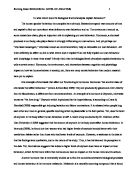Using one or more Examples, Explain Effects of Neurotransmission on Human Behaviour
Using one or more Examples, Explain Effects of Neurotransmission on Human Behaviour (8-Marks)
Neurotransmission is when an electrical impulse from a neurotransmitter causes a chemical messenger to be released across a synapse and bind to the dendrites at the other side of the synapse, and once absorbed, a new electrical impulse (carrying the same message) is sent out and this process repeats until the message has reached its target. Humans depend on neurotransmission to produce thoughts, feelings and actions, with the neurotransmitters governing the brain’s chemical functions. And when all is working as it should be, humans exhibit ‘normal’ behaviour, e.g: If the body has sufficient levels of the serotonin neurotransmitter, a sense of content and happiness is promoted.








